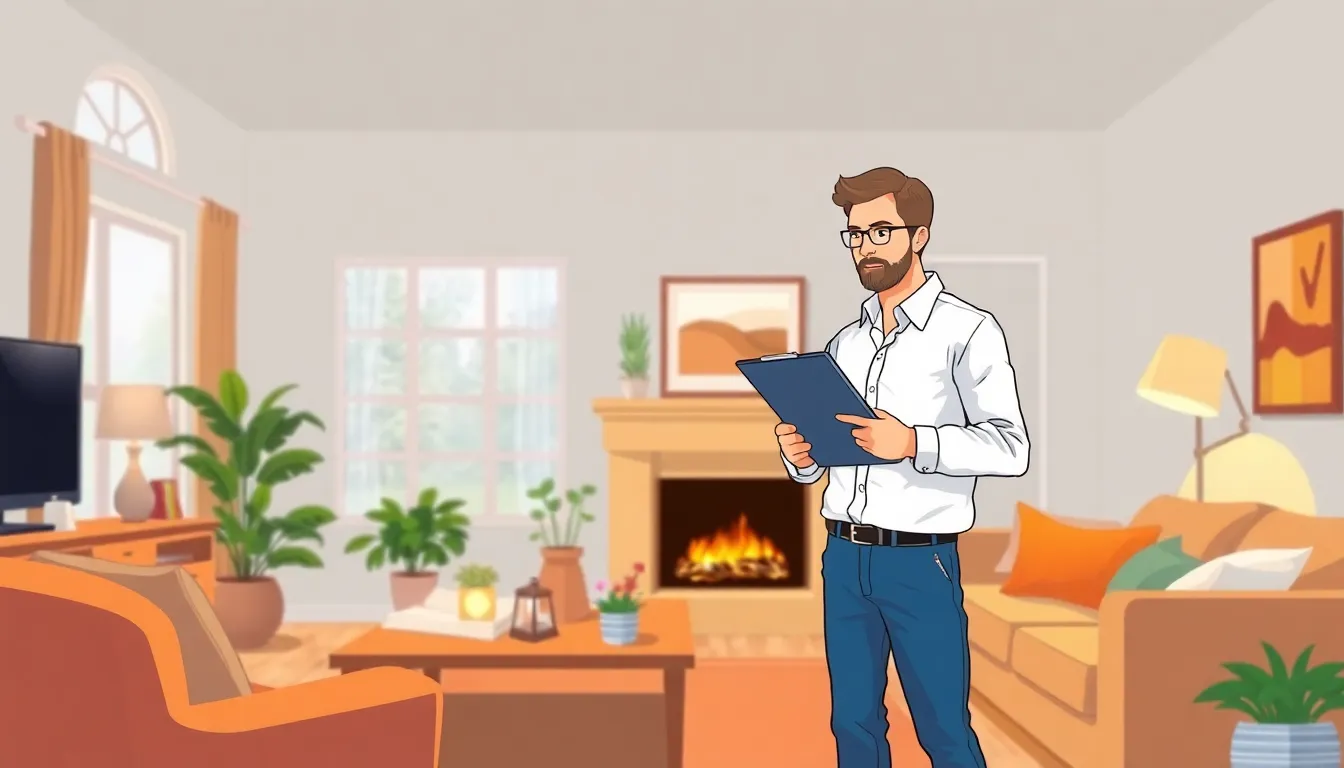Table of Contents
ToggleNavigating the world of renting in Utah can feel like trying to find a needle in a haystack—if that needle could evict you for not paying rent on time. Understanding tenant rights is crucial for anyone looking to secure their cozy abode without falling prey to landlord shenanigans. From security deposits to maintenance issues, knowing the ins and outs of these rights can save tenants from unnecessary headaches and maybe even a few sleepless nights.
Overview of Utah Tenant Rights
Utah tenants possess specific rights designed to protect them from unfair practices. These rights include the ability to live in a habitable environment. Landlords must ensure that properties meet health and safety standards.
Security deposits form another important aspect of tenant rights. Landlords can charge up to one month’s rent for security deposits. Tenants deserve a full accounting of any deductions made from this deposit within 30 days of moving out.
Maintenance responsibilities also play a critical role. Tenants can request repairs for issues that significantly affect their living conditions. If landlords fail to address these requests, tenants may have grounds for legal action.
Notice periods regarding eviction are strictly defined. For non-payment of rent, landlords must provide a 3-day notice. In other cases, a 30-day notice typically applies, allowing tenants time to remedy the situation.
Privacy rights are crucial to tenant agreements as well. Landlords must provide reasonable notice before entering rental units. Generally, a 24-hour notice suffices, unless there’s an emergency.
Protection against retaliation is included in Utah tenant laws. Tenants who report hazards or exercise their rights cannot face retaliation from landlords. Such actions include eviction or rent increases as a response to complaints.
Understanding these rights empowers tenants. Knowledge of state laws aids in effectively addressing conflicts with landlords. Familiarity with tenant rights leads to a smoother rental experience.
Key Rights for Tenants in Utah

Understanding tenant rights is essential for anyone renting in Utah. Here are some key rights:
Right to a Habitable Home
Tenants in Utah enjoy the right to a habitable home. Landlords must provide a living environment that meets health and safety standards. If significant issues arise, such as plumbing or heating failures, tenants can request prompt repairs. Failure to address these issues may lead to legal action. Tenants may even seek reductions in rent until problems are resolved.
Right to Privacy
The right to privacy is significant for tenants in Utah. Landlords must provide reasonable notice, typically 24 hours, before entering rental units. Exceptions exist for emergencies, allowing immediate access. Tenants deserve the assurance that their space remains private, promoting a sense of security in their home. Invasive behavior from landlords can lead to legal repercussions.
Right to Non-Discrimination
Utah tenants possess the right to non-discrimination based on specific criteria. These criteria include race, color, religion, sex, national origin, familial status, and disability. Discriminatory practices are unlawful and can result in legal consequences for landlords. Tenants facing discrimination should document incidents and report them to the appropriate authorities, such as the Utah Antidiscrimination and Labor Division. Access to housing must remain fair and equitable for all individuals.
Lease Agreements and Tenant Responsibilities
Lease agreements outline both tenant and landlord obligations. Understanding these terms is vital for smooth tenancies. Specific clauses cover rent amounts, due dates, and lease duration. Tenants must adhere to policies concerning property use. For example, subletting without permission might violate the lease.
Understanding Lease Terms
Lease terms specify essential conditions tenants agree to upon signing. Rental amount, payment procedures, and lease duration are typically included. Detailed provisions might address maintenance responsibilities and pet policies. Reviewing lease details helps tenants avoid misunderstandings. A solid grasp of the terms protects tenants from potential disputes.
Security Deposits and Returning Funds
Security deposits serve as financial protection for landlords against property damage. In Utah, a landlord can charge up to one month’s rent as a deposit. Upon moving out, landlords must provide a written accounting of deductions within 30 days. Tenants should document the property’s condition to support their claims for refund eligibility. Awareness of these processes ensures tenants receive their rightful funds back, provided there’s no damage beyond normal wear and tear.
Rent and Payment Regulations
Understanding rent and payment regulations is critical for Utah tenants. Knowledge of these laws ensures tenants can navigate their responsibilities and rights effectively.
Rent Control in Utah
Utah does not impose statewide rent control. Landlords set rental rates according to market conditions. Tenants may negotiate rates with landlords at lease renewal. It’s essential for tenants to research local market trends to assess fairness. Some municipalities may enact individual rent regulations, so tenants should check local ordinances. Awareness of these factors helps tenants make informed decisions about their rental agreements.
Late Fees and Payment Plans
Utah landlords can charge late fees for overdue rent, but these fees must be reasonable. Renters should review their lease agreements for specified late fee structures. Upon late payment, many landlords provide grace periods before enforcing fees. Tenants are encouraged to communicate with landlords regarding payment challenges. Open discussions can lead to potential payment plans or extensions. Understanding lease terms and maintaining transparent communication prevents misunderstandings in rental obligations.
Eviction Process in Utah
The eviction process in Utah involves specific procedures that landlords must follow. Understanding these legal requirements helps tenants navigate potential eviction situations effectively.
Grounds for Eviction
Landlords in Utah can initiate eviction for several reasons. Non-payment of rent constitutes the most common ground. Other justifiable reasons include violations of lease terms, illegal activities on the premises, or allowing unauthorized occupants. Furthermore, landlords may evict tenants if they fail to maintain the property or cause significant damage. Tenants should keep documentation and communication records regarding lease compliance to support their position.
Legal Procedures for Eviction
Legal procedures for eviction in Utah must adhere to strict guidelines. First, landlords must provide written notice, typically a 3-day notice for non-payment and a 30-day notice for other violations. After the notice period, if the tenant does not remedy the issue, landlords may file an eviction lawsuit in the local district court. Upon filing, tenants receive a summons and have the right to contest the eviction in court. Finally, if the court rules in favor of the landlord, they may obtain a judgment and can request the sheriff to enforce eviction.
Resources for Tenants
Utah tenants can access several resources that provide support and information about their rights.
Local Tenant Advocacy Groups
Numerous local tenant advocacy groups exist throughout Utah, offering assistance and education on tenant rights. Organizations such as the Utah Tenants’ Union work to empower tenants by providing resources like workshops and legal information. Community members can also seek guidance on dealing with landlord disputes or discrimination issues. Local groups often advocate for policy changes that benefit tenants and promote fair housing practices across the state. By connecting with these organizations, tenants gain valuable insights and support.
Legal Aid Services
Various legal aid services operate in Utah to assist tenants with legal concerns. Nonprofit organizations like Utah Legal Services offer free or low-cost legal representation for individuals facing eviction or other housing-related issues. These organizations can provide a range of services, including legal advice, assistance with court documents, and representation during hearings. Many legal aid offices help tenants understand their rights and navigate the legal system, especially during challenging situations. Accessing these resources equips tenants with the necessary tools to address their concerns effectively.
Navigating the rental landscape in Utah requires a solid understanding of tenant rights. By being informed about their rights and responsibilities tenants can foster a more positive renting experience. From knowing the rules around security deposits to understanding eviction processes and maintenance requests tenants are better equipped to advocate for themselves.
Utilizing available resources like tenant advocacy groups can also provide valuable support. Empowered with knowledge and assistance tenants can confidently address issues that arise and ensure their living conditions meet legal standards. Ultimately this awareness not only protects their rights but also enhances their overall rental experience in Utah.




